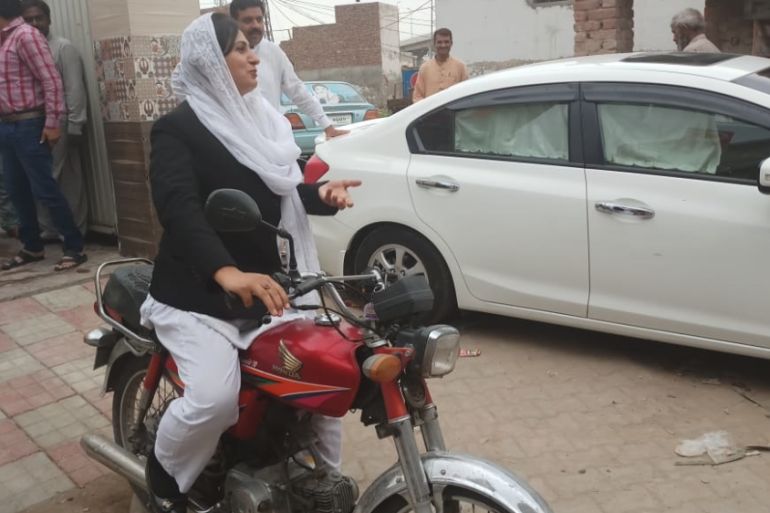Pakistan elections: Who is ANP’s only female candidate in Punjab?
Secular party member Noshin Afshan contests in first polls and vows to promote women’s rights in PTI-stronghold Multan.

Wearing a shalwar kameez and a scarf loosely covering her head, Noshin Afshan carefully steers through the narrow, winding roads of Multan on a motorcycle.
She usually drives a car but had to borrow a motorcycle from a fellow male party member to navigate the congested neighbourhoods of the conservative city.
Keep reading
list of 4 itemsBehind India’s Manipur conflict: A tale of drugs, armed groups and politics
Solomon Islands prepares for ‘most important election since independence’
Six takeaways from first day of Trump’s New York hush money criminal trial
Afshan, 36, is on a door-to-door campaign in the ancient “City of Saints” in southern Punjab, meeting voters ahead of Pakistan’s general elections on Wednesday.
She says she is often met with a mix of shock and appreciation.
“It’s always been in my nature to work like the men,” she told Al Jazeera by phone. “I have never … considered myself less than the men; never, not at all.”
The mother of three, from the small city of Jatoi in Muzaffargarh district, south Punjab, is up against 15 men for a general seat in the National Assembly under the banner of the secular Awami National Party (ANP).
It is the first time she is contesting the elections.
A lawyer by profession with a Master’s in English, Afshan is ANP’s only female candidate running in Pakistan’s most populous province, Punjab.
“I want to serve my country which is why I came into the elections, so I can get to that position and fight for my region,” she said.
Campaign challenges
The campaign has posed its fair share of challenges.
![Afshan is a High Court lawyer in Multan [Photo courtesy: Noshin Afshan]](/wp-content/uploads/2018/07/0207c637a4aa4ee194961c5cf8776cf0_18.jpeg)
“Sometimes I get blackmailed, and as a woman, they [voters] try to fool me,” she said. “They make elections a way to earn, asking for money in exchange for votes and using all kinds of tactics, but I’m trying to avoid them.”
The region she’s contesting from has several challenges, Afshan says.
“Southern Punjab is in a bad state; they are not getting the same facilities as upper Punjab.”
Multan, a city of more than 1.8 million people, relies on its textile and agricultural industries.
Language and ethnic identity typically influence voters’ decisions in the predominantly urban constituency of NA-155, from where Afshan is running.
Pakistan Tehreek-e-Insaaf (PTI), the party led by cricketer-turned-politician Imran Khan which clinched the NA-155 Multan constituency at the last election, is expected to perform well along with the Pakistan Muslim League-Nawaz (PML-N).
But as an underdog, ANP’s Afshan is optimistic and hopeful about election day.
She promises to focus on women’s rights, education and better healthcare.
“We have laws, but we don’t have a system in place so that those laws can be implemented,” said Afshan, who is currently working towards a Master’s in Philosophy from Multan’s Institute of Southern Punjab (ISP). “I want to change that system.”
ANP targeted
ANP is an ethnic Pashtun nationalist partly mainly based in the northwestern Khyber Pakhtunkhwa province and known for its progressive and secular positions.
Earlier in July, a suicide attacker targeted one of its election rallies in Peshawar, killing at least 20 people including ANP’s senior leader Haroon Bilour. The Pakistan Taliban claimed responsibility for the violence.
The party has been dogged by corruption allegations since its last provincial government term in Khyber Pakhtunkhwa from 2008 to 2013.
“Some people are against our party, they say it’s a deceitful party,” said Afshan. “There have been problems during the campaign, but you have to deal with them.”
![Election banners for ANP line a road in Peshawar, Pakistan [Muhammad Sajjad/AP]](/wp-content/uploads/2018/07/f9fe28db957844e692e70e0d1da3e393_18.jpeg)
Political space for women
In the outgoing government, women made up more than 20 percent of legislators – both in Punjab and National Assembly.
Under the Elections Act, 2017, a fixed five percent quota is allotted by each party to women contesting for parliamentary seats.
A further 60 out of 342 seats are reserved for women in the National Assembly as well as 137 in the four provincial assemblies, according to the constitution.
Afshan is among 13 women out of a total of 201 ANP candidates vying for national and provincial seats across the nation.
“Women have played an important role in our party,” said Omer Khan Gardezi, the acting president of ANP’s Punjab division.
“We are giving women opportunities to include them in the general council seats and make them MNAs and MPAs,” Gardezi told Al Jazeera by phone from Khushab district in central Punjab. “There is always space for them in our mandate.”
![ANP's Noshin Afshan on the campaign trail in Multan [Rashid Hameed Bhutta/Samaa TV]](/wp-content/uploads/2018/07/d7cb2b64cb594875942e8c5bfc0ed2dd_18.jpeg)
On July 25, a record 171 female candidates out of a total of 3,675 will run for National Assembly seats.
Some analysts believe Pakistan’s only female prime minister, Benazir Bhutto, who twice led the country in the late 80s and mid-90s, paved the way for Pakistani women aspiring to enter politics.
“They [female politicians] have been much more accessible to women’s rights and to marginalised groups than male parliamentarians have been, and they have also influenced the nature of politics,” said Yasmin Zaidi, director of the Center of Gender and Policy Studies, a research and advocacy group based in the capital, Islamabad.
Back in Multan, Baloch is giving her campaign one final push, knocking on doors with a lantern – ANP’s party symbol – in her hand.
“It’s a tragedy that women are not considered in high regard when they work like men, but the mindset has changed to a great extent; a lot of people also appreciate women who are working hard.”
Follow Saba Aziz on Twitter: @saba_aziz